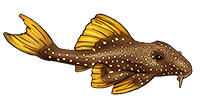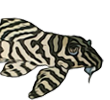| Scientific Name | Parotocinclus jumbo Britski & Garavello, 2002 |
| Common Names | LDA025, Pitbull Pleco Goby Pleco, Pitbull Pleco (Germany), Pitbull-sugemalle (Denmark) |
| Type Locality | Rio Paraíba do Norte, at bridge on road PB 408, northwest of Umbuzeiro, 7°38'27"S, 35°42'30"W, Paraíba, Brazil. |
| Pronunciation | parr auto SINK luss - jum BOW |
| Etymology | Parotocinclus: Greek, para in the side of + greek, ous, otis = ear + Greek, kygklos, ou = a fish. The specific epithet refers to the large size attained by the species in contrast to its congeners. |
| Articles | |
| Size | 58mm or 2.3" SL. Find near, nearer or same sized spp. |
| Identification | The genus Parotocinclus can readily be distinguished from Otocinclus by the presence of an adipose fin in the former. Different shade of grey, ranging from medium to dark grey, with some greenish and golden shades. Its bigger adult size and blunter forehead compared to other Parotocinclus make it straightforward to ID. Britski and Garavello agree that a review of the genus Parotocinclus should be undertaken and that this species should be placed in another, new, genus. |
| Sexing | Males have longer pelvic fins, the tip of which extends beyond the origin of the anal fin, the urogenital papilla is positioned just after the anal opening in males. In females the tip of the pelvic fin does not reach the anal fin origin and the urogenital duct opens to the inner cloacal cavity. |
| General Remarks | Erwin Schraml introduced the LDA number in Das Aquarium, March 1996. |
| Distribution | South America: Paraiba do Norte and Piranhas rivers in Paraiba State, Canhotinho River in Pernambuco State, a tributary of the Mundau River, flowing near the city of Maceio in Alagoas State, and Salgado River in Ceara State, Brazil. Paraíba do Norte (click on these areas to find other species found there) Southern Atlantic Draining Rivers, North East Brazil Coastal Rivers, Mundaú (Alagoas), Canhotinho (click on these areas to find other species found there) Southern Atlantic Draining Rivers, North East Brazil Coastal Rivers, Mundaú (Alagoas) (click on these areas to find other species found there) Ceará State Rivers, Jaguaribe, Salgado (click on these areas to find other species found there) Login to view the map. |
| IUCN Red List Category | Least Concern , range map and more is available on the IUCN species page. Last assessed 2018. |
| pH | 6.4 - 7.6 |
| Temperature | 20.0-26.0°C or 68-78.8°F (Show species within this range) |
| Feeding | Mainly vegetarian. It will make gravel roll between its lips to remove organic matters. It accepts vegetables, or commercially prepared food such as Spirulina tabs. It will eat, once in a while, animal protein such as bloodworm but this should not be the bulk of the main diet. User data. |
| Furniture | This species spends most of its time on the bottom, they hardly venture onto different surfaces except to feed. Use a fine, sandy bottom as this species likes to bury itself when alarmed. Driftwood is a good idea, and plants can be kept as they will not be eaten. In the wild, P. jumbo is collected from flat areas in the middle course of the river. These are shallow, clear waters with low current, sandy and rocky bottoms, and marginal vegetation. |
| Compatibility | A very good citizen. Avoid keeping it with larger fish that would eat it. Should be kept in groups. |
| Breeding | Similar to many Corydoras species - see Shane's World reproduction article. |
| Breeding Reports | There is but a single breeding report, read it here. |
| Reference | Ichthyological Exploration of Freshwaters v. 13 (no. 3), pp 280, Fig. 1. |
| Registered Keepers | There are 69 registered keepers, view all "my cats" data. |
| Wishlists | Love this species? Click the heart to add it to your wish list. There are 9 wishes to keep this species, see who wants what. |
| Spotters | Spotted this species somewhere? Click the binoculars! There are 12 records of this fish being seen, view them all. |
| Forum BBCode | |
| Search for P. jumbo | |
| Look up P. jumbo on AquaticRepublic.com | |
 | Look up P. jumbo on Fishbase |
 | Look up P. jumbo on Encyclopedia of Life |
 | Look up P. jumbo on Global Biodiversity Information Facility |
| LFS label creator ARN ref:1.4.72.236 | |
| Last Update | 2022 Feb 03 10:33 (species record created: 2001 May 05 00:00) |





/siluriformes/loricariidae/parotocinclus/jumbo/1.jpg)
/siluriformes/loricariidae/parotocinclus/jumbo/2.jpg)
/siluriformes/loricariidae/parotocinclus/jumbo/3.jpg)
/siluriformes/loricariidae/parotocinclus/jumbo/4.jpg)
/siluriformes/loricariidae/parotocinclus/jumbo/5.jpg)
/siluriformes/loricariidae/parotocinclus/jumbo/6.jpg)
/siluriformes/loricariidae/parotocinclus/jumbo/7.jpg)
/siluriformes/loricariidae/parotocinclus/jumbo/8.jpg)
/siluriformes/loricariidae/parotocinclus/jumbo/9.jpg)
/siluriformes/loricariidae/parotocinclus/jumbo/10.jpg)
/siluriformes/loricariidae/parotocinclus/jumbo/11.jpg)
/siluriformes/loricariidae/parotocinclus/jumbo/12.jpg)
/siluriformes/loricariidae/parotocinclus/jumbo/13.jpg)
/siluriformes/loricariidae/parotocinclus/jumbo/14.jpg)
/siluriformes/loricariidae/parotocinclus/jumbo/15.jpg)
/siluriformes/loricariidae/parotocinclus/jumbo/16.jpg)
/siluriformes/loricariidae/parotocinclus/jumbo/17.jpg)
/siluriformes/loricariidae/parotocinclus/jumbo/18.jpg)